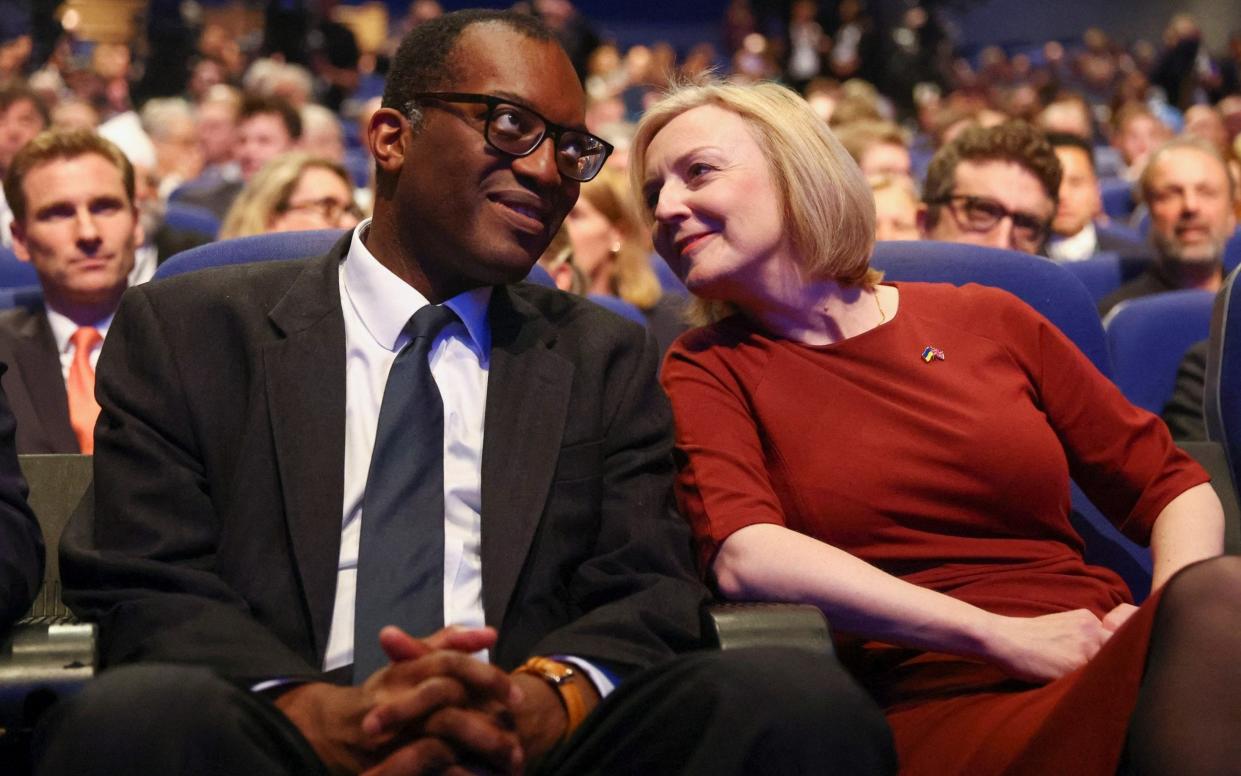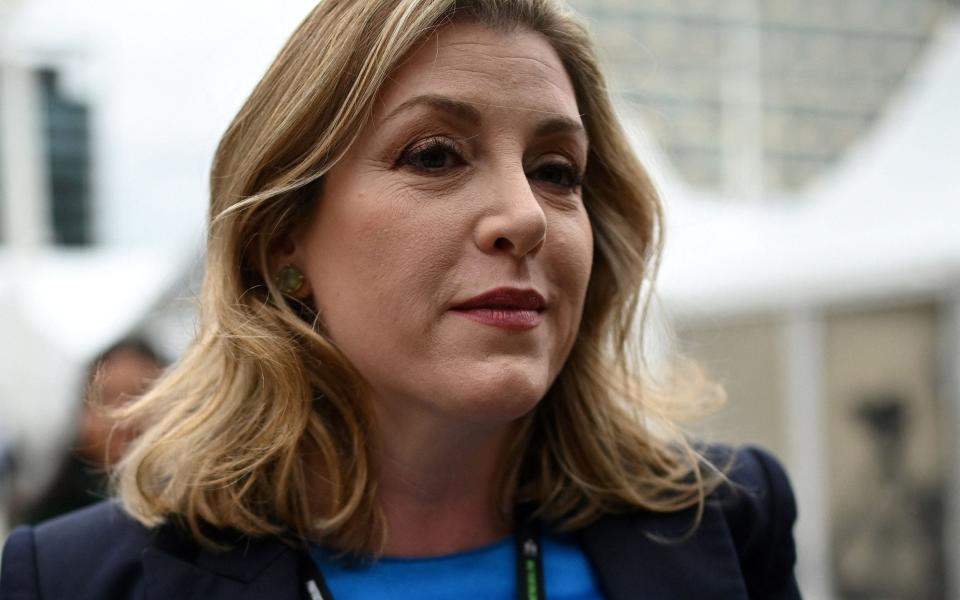'Hard workers will not welcome a policy which gives those on benefits a higher rise than them'

- Oops!Something went wrong.Please try again later.
Chancellor Kwasi Kwarteng hinted that Universal Credit will rise with inflation at a Conservative Party Conference fringe event, as he stressed the need for compassionate conservatism and said “we do have a duty to look after very vulnerable people”.
Amid a Cabinet row, several Cabinet ministers, including Penny Mordaunt, the Leader of the Commons, turned on Liz Truss, arguing that the Universal Credit payments must increase in line with CPI inflation after speculation that Ms Truss was weighing up linking it to average earnings, a lower figure.
The open willingness of Cabinet ministers to argue against a measure being weighed up by their own leader became a symbol of fractured Tory unity on Tuesday.
The majority of readers question why benefits should rise in accordance with inflation when private sector wages do not. However, some readers saw the sense in raising benefits during the cost of living crisis, as this will prevent more people turning to food banks in dire need.

‘Benefits for the able-bodied unemployed ought to be a safety net, not a good living wage’
@Raymond Forster:
“Now it looks like Kwasi Kwarteng is getting on the redistribution train.
“How can it be right that those who pay for the benefits wind up getting lower pay rises than those they effectively ‘pay’ themselves? This is madness.”
@Clive Chopping:
“Mordaunt is a disgrace to the Party. There is no way that people in work or the self-employed should be getting a lower rise than those on benefits. That is not a Tory policy; it is a socialist one, and if Mordaunt really believes that she should join Labour or the Lib Dems.”
@ Martin Woodford:
“So people not in work, for whatever reason, will get a pay rise roughly double what most people in work can expect to get. Can you now blame the RMT strikers, the postmen and firefighters, people who do really important and some, very dangerous jobs? Who would take a low paid job under these circumstances?”
@CC:
“I think the Party is reading the country wrong on this. Hard working people and the self-employed will not welcome a policy which gives those on benefits a higher rise than them, and rightly so.”
@Don Murray:
“Here’s an idea: If you’re fit for work, you will be found a job. There are a million vacancies and absolutely no excuse to be unemployed, and certainly no reason to expect a pay rise when those paying you don’t get one.”
@Ysanne Carlisle via Telegraph Community Facebook Group:
“Able-bodied people on benefits should never receive more money than those who work. Tax credits maybe, but not benefits because there is no incentive to work. Benefits for the able-bodied unemployed ought to be a safety net, not a good living wage.”
@John J:
"I'm hopeful the Tories have begun to realise their responsibility. This will be a truly hellish few years of inflation that takes food off the table for many. Causing real pain and suffering has no place in the UK.
"There is a real issue of people who can't work versus those who simply can’t be bothered. This should be the focus for radical policy. Indexing benefits will not reduce inflation, but it is also not inflationary. Increasing the labour pool will reduce inflation and cut immigration."
'The aim should be to reduce dependency that is growing up around food banks'
@Robert Young:
“Whilst expensive, it makes sense to raise most benefits, including Universal Credit by rate of inflation; otherwise it will just force more people to use food banks etc, which electorally would be a disaster. The aim should be to reduce dependency that is growing up around food banks, especially at a time when supplies to them are reducing as supermarkets get better at reducing waste.”
@John J:
“I'm hopeful the Government has begun to realise their responsibility. This will be a truly hellish few years of inflation that takes food off the table for many. Causing real pain and suffering has no place in the UK, and those that subscribe to it should get on a plane and never come back.
“But the very real issue of people that can't work or can’t be bothered is in sharp relief. This should be the focus for radical policy. Indexing benefits will not reduce inflation, but is not inflationary. Increasing the labour pool will reduce inflation and cut immigration.”
@Andy Douglas:
“It’s about time the private sector paid wages that don’t require workers to get benefits.
“Unfortunately, this is the result of decades of economic mismanagement, creep of the welfare state and our addiction to cheap consumption.”
Alternative solutions: 'Working needs to be more rewarding as an employee'
Readers also shared other ways in which the Government can help those grapple with rising inflation, and suggested solutions that would reduce the need for a rise in Universal Credit, such as incentivising employment.
@Peter Repper:
“In reality, working needs to be more rewarding as an employee: less stress, less scrutiny, more control over how you work. Employers exact too much now; they want total control over people and continual scrutiny. Unless you are really well paid, being an employee is rubbish.”
@John Helliwell:
“As a person on benefits because of my health, I have coped well so far with the cost of living crisis due to the Government support provided. My inflation has therefore been less than the 10 per cent figure, as energy inflation has been mitigated, at least for the next six months.
“I think an increase should be linked to the domestic inflation rate, between five per cent and six per cent. Once energy prices return to normal, this will be fair to both claimants and taxpayers, provided next year's inflation calculations exclude falling energy prices.”
@John Youngs:
“We want able people on short hours to work more hours. Benefits cannot be too generous. However, there is one feature of benefits that is against productivity and fairness: Taper rate. If it is right for the maximum rate of tax for the rich to only be 45 per cent , how can it be right to have a taper rate of 55 per cent on Universal Credit?
“Our government claims to want more people to work more hours. A taper rate of around 20-30 per cent would be an encouragement to do more hours. People on benefits face an effective terminal tax rate of 55 per cent on top of normal tax. It's bonkers.”
@Jimmy Boy:
“We all agree we need to be compassionate with those who need it, but the problem is with the absurdly lenient eligibility criteria and the fact that benefits are neither contribution-based nor time-limited.”
@William Humes:
“In a period of ‘abnormal’ inflation - caused by the Ukraine War - pay settlements and benefits increases should be partly made by ‘one off’ cash payments, which do not become the base for future annual pay agreements when inflation eventually comes down.
“If everyone gets a 10 per cent pay rise, next year it will be 15 per cent, year after 20 per cent, then we are stuffed.”

